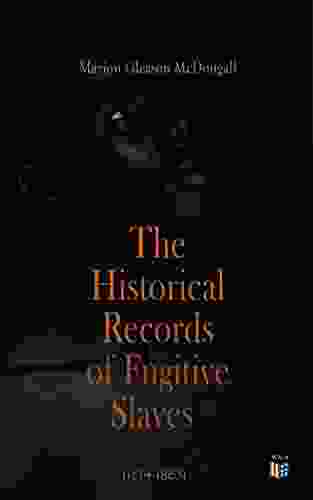The Historical Records of Fugitive Slaves, 1619-1865: An Exploration of Resistance and Resilience in the Antebellum Era

The history of slavery in the United States is a complex and tragic one. For over two centuries, millions of Africans and their descendants were forced to endure the horrors of bondage. However, even in the face of such oppression, many enslaved people found ways to resist and fight for their freedom. One of the most powerful forms of resistance was the act of fleeing slavery.
Fugitive slaves were individuals who escaped from bondage and sought refuge in free territory. The journey to freedom was often perilous, but for many, it was a risk worth taking. The historical records of fugitive slaves provide a glimpse into the lives of these courageous individuals and the struggles they faced in their quest for freedom.
4.8 out of 5
| Language | : | English |
| File size | : | 2896 KB |
| Text-to-Speech | : | Enabled |
| Enhanced typesetting | : | Enabled |
| Word Wise | : | Enabled |
| Print length | : | 267 pages |
| Screen Reader | : | Supported |
The Legal Framework of Slavery
The legal framework of slavery in the United States was designed to ensure the complete control of enslaved people by their owners. Slaves were considered property, and they had no legal rights. They could be bought, sold, and traded like any other commodity. Slaves could also be punished for any perceived offense, and their owners were not held accountable for their actions.
The Fugitive Slave Act of 1850 further strengthened the legal framework of slavery. This law made it a federal crime to assist a fugitive slave in any way. It also allowed slave owners to travel into free states and reclaim their "property" without due process of law.
Resistance and Resilience
Despite the legal obstacles, many enslaved people found ways to resist and fight for their freedom. One of the most common forms of resistance was the act of running away. Fugitive slaves often traveled hundreds of miles on foot, by boat, or by train to reach free territory. They often faced great danger along the way, but they were determined to escape the horrors of slavery.
Fugitive slaves also found other ways to resist their oppressors. They organized work stoppages, staged revolts, and even fought back against their owners. In many cases, fugitive slaves found support from abolitionists and other free people who were willing to help them on their journey to freedom.
The Underground Railroad
The Underground Railroad was a network of secret routes and safe houses that helped fugitive slaves escape to freedom. The network was organized by abolitionists and other free people who were committed to the cause of ending slavery. Fugitive slaves often traveled along the Underground Railroad in disguise, and they were often helped by conductors who guided them along the way.
The Underground Railroad was a dangerous and illegal operation, but it was also a vital lifeline for fugitive slaves. The network helped thousands of people escape to freedom, and it played a major role in the abolitionist movement.
The Civil War and Emancipation
The Civil War was a watershed moment in the history of slavery in the United States. The war began in 1861 when Confederate forces attacked Fort Sumter in South Carolina. The Union victory in the Civil War led to the abolition of slavery and the emancipation of millions of enslaved people.
The Civil War also had a profound impact on the lives of fugitive slaves. Many fugitive slaves joined the Union Army and fought for their freedom on the battlefield. Others worked behind the lines, providing support for the Union cause. The Civil War was a time of great upheaval and change, but it also marked the beginning of a new era for African Americans in the United States.
The Legacy of Fugitive Slaves
The legacy of fugitive slaves is a complex and multifaceted one. Fugitive slaves were courageous individuals who risked their lives to fight for their freedom. They were also a symbol of the resilience and determination of the human spirit. The historical records of fugitive slaves provide a valuable insight into the lives of these individuals and the struggles they faced in their quest for freedom.
The legacy of fugitive slaves is also a reminder of the horrors of slavery and the ongoing struggle for racial justice. The United States has come a long way since the days of slavery, but there is still much work to be done to achieve true equality for all.
The historical records of fugitive slaves are a powerful reminder of the resilience and determination of the human spirit. Fugitive slaves were courageous individuals who risked their lives to fight for their freedom. They were also a symbol of the horrors of slavery and the ongoing struggle for racial justice.
The legacy of fugitive slaves is a complex and multifaceted one, but it is a legacy that is worth remembering. Fugitive slaves were pioneers in the fight for freedom, and their stories continue to inspire us today.
References
- Foner, Eric. _Gateway to Freedom: The Underground Railroad._ New York: Harper & Row, 1975.
- Gutman, Herbert G. _The Black Family in Slavery and Freedom, 1750-1925._ New York: Pantheon Books, 1976.
- Hine, Darlene Clark, and Stanley Harrold. _The African-American Odyssey._ Upper Saddle River, NJ: Prentice Hall, 2006.
4.8 out of 5
| Language | : | English |
| File size | : | 2896 KB |
| Text-to-Speech | : | Enabled |
| Enhanced typesetting | : | Enabled |
| Word Wise | : | Enabled |
| Print length | : | 267 pages |
| Screen Reader | : | Supported |
Do you want to contribute by writing guest posts on this blog?
Please contact us and send us a resume of previous articles that you have written.
 Top Book
Top Book Novel
Novel Fiction
Fiction Nonfiction
Nonfiction Literature
Literature Paperback
Paperback Hardcover
Hardcover E-book
E-book Audiobook
Audiobook Bestseller
Bestseller Classic
Classic Mystery
Mystery Thriller
Thriller Romance
Romance Fantasy
Fantasy Science Fiction
Science Fiction Biography
Biography Memoir
Memoir Autobiography
Autobiography Poetry
Poetry Drama
Drama Historical Fiction
Historical Fiction Self-help
Self-help Young Adult
Young Adult Childrens Books
Childrens Books Graphic Novel
Graphic Novel Anthology
Anthology Series
Series Encyclopedia
Encyclopedia Reference
Reference Guidebook
Guidebook Textbook
Textbook Workbook
Workbook Journal
Journal Diary
Diary Manuscript
Manuscript Folio
Folio Pulp Fiction
Pulp Fiction Short Stories
Short Stories Fairy Tales
Fairy Tales Fables
Fables Mythology
Mythology Philosophy
Philosophy Religion
Religion Spirituality
Spirituality Essays
Essays Critique
Critique Commentary
Commentary Glossary
Glossary Bibliography
Bibliography Index
Index Table of Contents
Table of Contents Preface
Preface Introduction
Introduction Foreword
Foreword Afterword
Afterword Appendices
Appendices Annotations
Annotations Footnotes
Footnotes Epilogue
Epilogue Prologue
Prologue Joanna Fortune
Joanna Fortune Magdalena Wszelaki
Magdalena Wszelaki Patrick Thomas
Patrick Thomas Peter Afflerbach
Peter Afflerbach Sheena Binkley
Sheena Binkley Laura D Adams
Laura D Adams Kathy Stanton
Kathy Stanton Richard Peet
Richard Peet Matt Buonocore
Matt Buonocore Ingersoll Lockwood
Ingersoll Lockwood Eli Wilhide
Eli Wilhide Deanna Chase
Deanna Chase Jim Help
Jim Help Shawna Wingert
Shawna Wingert Sean Starr
Sean Starr James Evans
James Evans John A Brennan
John A Brennan Everina Maxwell
Everina Maxwell Adriaan Brits
Adriaan Brits Alexander Stepanov
Alexander Stepanov
Light bulbAdvertise smarter! Our strategic ad space ensures maximum exposure. Reserve your spot today!
 Darnell MitchellFollow ·16.6k
Darnell MitchellFollow ·16.6k Justin BellFollow ·3.4k
Justin BellFollow ·3.4k Billy PetersonFollow ·10.8k
Billy PetersonFollow ·10.8k Edward ReedFollow ·16k
Edward ReedFollow ·16k Ben HayesFollow ·8.4k
Ben HayesFollow ·8.4k Ernest PowellFollow ·6.7k
Ernest PowellFollow ·6.7k Maurice ParkerFollow ·9.7k
Maurice ParkerFollow ·9.7k Juan RulfoFollow ·4.7k
Juan RulfoFollow ·4.7k

 Dean Butler
Dean ButlerBlack Widow 2024: A Comprehensive Guide to Kelly...
In 2024, Marvel...

 Gage Hayes
Gage HayesNothing and the Speck: An In-Depth Analysis of Yana...
Yana Toboso's works, particularly the manga...

 Stan Ward
Stan WardThe Best American Poetry 1997: James Tate
The Best American Poetry...

 Corey Green
Corey GreenThe Chance of Home: Exploring the Poetic Landscape of...
Immerse yourself in the evocative world of...
4.8 out of 5
| Language | : | English |
| File size | : | 2896 KB |
| Text-to-Speech | : | Enabled |
| Enhanced typesetting | : | Enabled |
| Word Wise | : | Enabled |
| Print length | : | 267 pages |
| Screen Reader | : | Supported |















